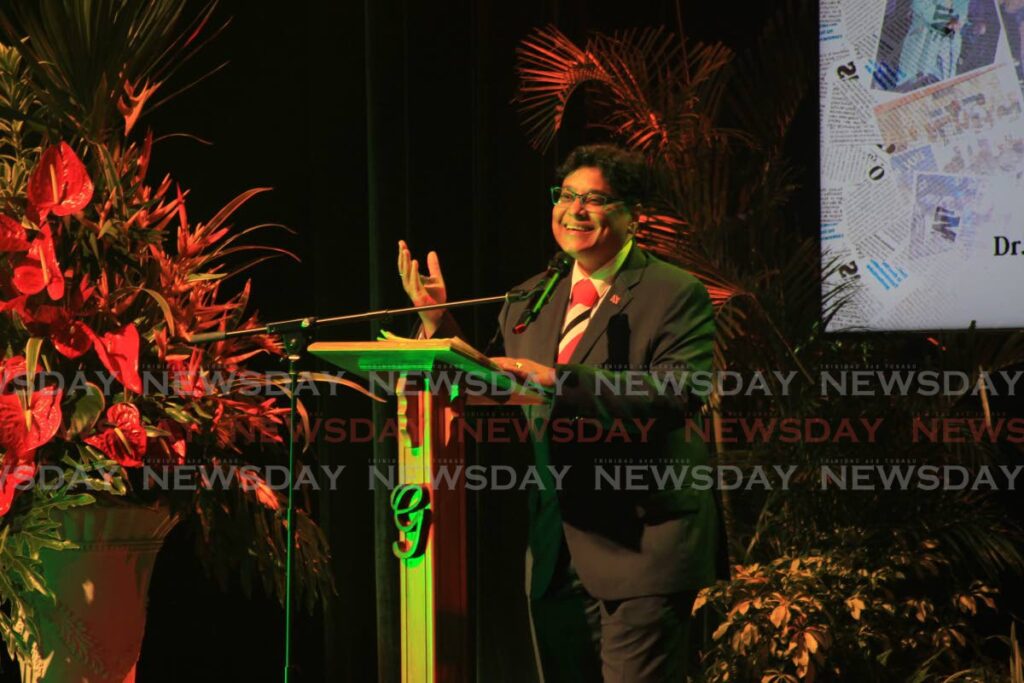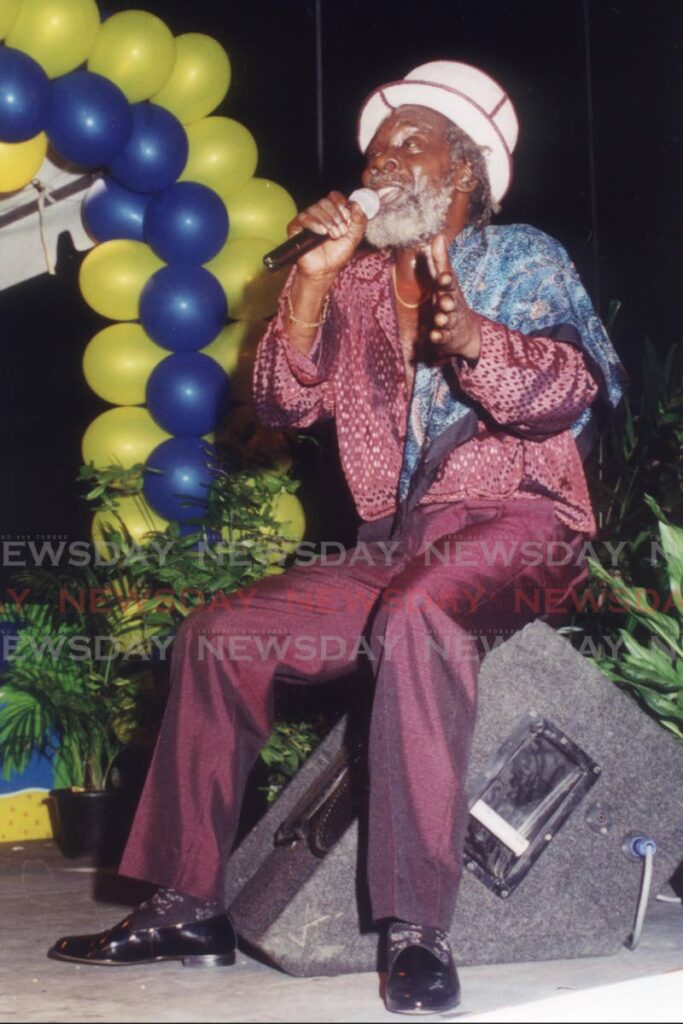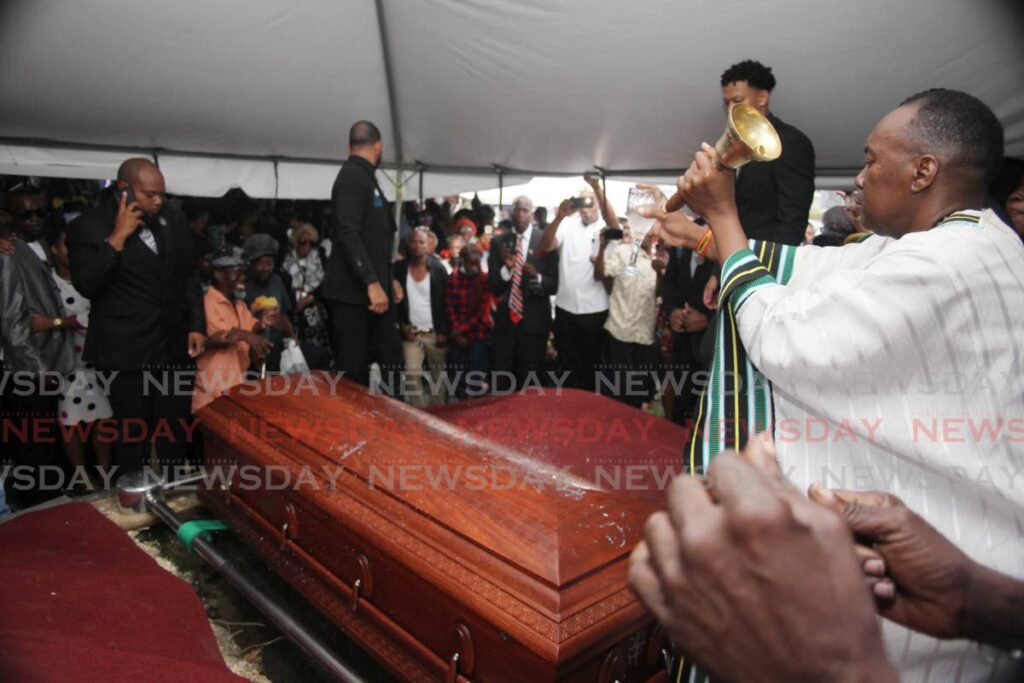Tributes and tears at Stalin's send-off – CARIBBEAN MAN

IT WAS no ordinary funeral.
Rather, a celebration of the life of a man of God and a man of country, Bishop Kessel Byer preached at the farewell service for calypso great Leroy "Black Stalin" Calliste on Thursday at the Southern Academy for the Performing Arts in San Fernando.
Lusty applause from the congregation was heard as the curtains on the stage where the service was held, opened to reveal the mahogany casket, with a huge ice, green and gold-coloured crown sitting on top amidst a bed of red anthuriums.
Musical tributes from icons such as Machel Montano, Austin "Super Blue" Lyons, Selvon "Mistah Shak" Noel, Stalin's grandson Kevan Calliste, Emrold “Brother Valentino” Phillip, 3 Canal, Weston "Cro Cro" Rawlins, Steve Jackson, Rondell Donawa, Chuck Gordon and others, set what turned out to be a celebratory tone.

At the end of the service, all calypsonians were invited on stage to serenade Stalin with a medley of his own songs.
It was a fitting tribute and the spoken words and many accolades were used to describe truly a Caribbean man who entertained and educated fans across the globe for almost half of a century.
Stalin's influence and contribution was recognised by Barbados Prime Minister Mia Mottley who sent Bajan calypsonian Anthony "Mighty Gabby" Carter, as her emissary, to represent the people and Government with a special tribute.
Carter said Stalin's contribution not only to TT, but also to the wider Caribbean in terms of unity and regional identity, cannot easily be described. He said Stalin was well-loved by the people of Barbados and that country's own calypsonians counted him as their inspiration.
Fellow Barbadian calypsonian Darcy "Ras Iley" Small also made the journey to Trinidad for his friend’s funeral.

Former president Anthony Carmona described Stalin as “a philosopher king who worked his magic in sound, rhythm and linguistic content.
“Call him an Abyssinian king and without seeking any European affirmation, I can safely say he was the Shakespeare of Calypso. Because like Shakespeare, he dealt with the flotsam and jetsam of human nature, cataloguing our pitfalls and heights with a creative."
Analysing the genius that was Stalin, Carmona said his popular song, Wait Dorothy Wait, the protagonist Dorothy was advised to stop partying until the impoverished, the voiceless and the marginalised, were dealt with and what was wrong, was fixed.
“A roots man and a champion for the oppressed, Stalin demanded affirmative change, lamenting inequality in all its forms, always lobbying for equality with regard to national patrimony and the commanding heights of the economy,” Carmona said.
For Calliste, he added, Black lives always mattered, long before that term gained popularity out of social injustices against American blacks. He said Calliste knew all too well that, the Black man “doh get nutten easy.”
He said Stalin was also a conduit and facilitator of national unity and racial harmony, reflecting on his personal relationship with late chutney icon, Sundar Popo, as one demonstrating that divisiveness has no place in a progressive society.
Although one of Stalin’s daughter’s Keina Calliste, in her eulogy said her father whom she described as the “people’s messenger,” never saw the inside of a polling booth or was affiliated with a political party, it was noteworthy that several politicians turned up to pay tribute to the griot.
She said he performed for almost all political parties, cleverly using his songs to communicate his message each time.
She recalled him performing, “We could make it if we try,” for one party and sometime later, would sing, “Better Days are Coming,” for another political party.
The Prime Minister, who on Thursday was in Tobago, sent a speech which was read by Housing Minister Camille Robinson- Regis.
Dr Rowley described Stalin as, “an unshakeable bastion of black consciousness and a staunch promoter of the exile’s sons and daughter’s re-discovery and romance with continental Africa.
“He, however, despised and scorned those who, alternatively, promoted 'racial politics', his messages being directed instead at the economic ills birthed by that same politics.
"His preferential option for the poor and downtrodden, marked him as the antithesis of capitalism and imperialism, and the oppression, pain, and suffering it wrought among people worldwide,” Robinson-Regis said as she read Rowley's speech.

Rowley said Stalin was, “cynical, defiant and resistant to oppression in the world order, but ever the optimist, as he urged us amidst the dark economic times of 1988 that, 'We could make it if we try just a little harder.
Rowley said despite Stalin's acridity against the political system, he possessed a patriotic pride second to none.
“So, the bard, the philosopher, the griot, the calypso king, the Caribbean Man, the Black Man is no more.
“Thank you Leroy, for your insights. We are poorer without you, but you have left us in Trinidad and Tobago, and the Caribbean in a more reflective place, with the possibilities inspired by your belief in our strength, and with a vision of a brighter tomorrow.
“You have left us a stronger more resilient people, and for that, we will be eternally grateful,” Rowley said.
Calliste was later buried at the Paradise cemetery in San Fernando.

Comments
"Tributes and tears at Stalin’s send-off – CARIBBEAN MAN"